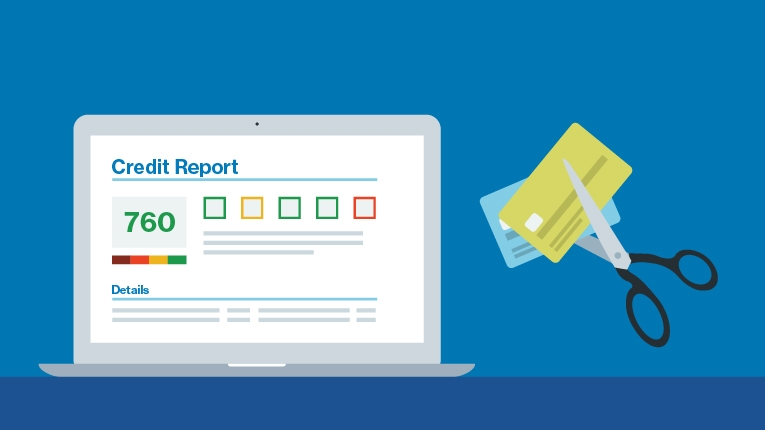4 good reasons to get a personal loan

While you can take out a personal loan for almost any reason—good reasons to consider using a personal loan include saving money by refinancing high-interest debt, debt consolidation, or carving a big expenditure into manageable payments.
For example, if you're planning home renovations or a wedding, you can benefit from predictable monthly payments and potentially lower interest rates than credit cards. A personal loan also may help you avoid overextending your budget because you’ll know exactly how much you have to spend. If you’re looking to consolidate high-interest debt, you could roll all your debt into one personal loan with a fixed rate, term and a single monthly payment. Plus, you'll know exactly when your debt will be paid off.
Whether you’d like to finance a big project or consolidate debt, here are some of the top reasons to get a personal loan.
4 good reasons to get a personal loan
1. To pay off high-interest-rate debt.
Loan refinancing and consolidation
Personal loans are commonly used to consolidate multiple balances from other high-interest loans or medical debt into a single loan with a fixed rate and term. It can help you save money by reducing your interest rate or by making it easier to pay off debt faster. A debt consolidation loan may also lower your monthly payment. The reasons for taking out a debt consolidation personal loan to pay down debt can vary depending on your circumstances.
For example, you may want to simplify your finances by decreasing your total number of monthly bills. You can do this by paying off multiple high-interest debts with your personal loan (i.e., debt consolidation), leaving you with a single monthly payment.
Ideally, you can also save money by finding a personal loan with a lower rate than your current debts. When that’s the case, it can make a lot of sense to refinance a single debt with a lower-rate personal loan, lowering your cost of borrowing money.
Consolidating and refinancing debts can also change your monthly payment amount. Choosing a personal loan with a shorter term will lead to higher monthly payments, but you’ll also pay off the loan much faster. Generally, you’ll save on interest costs over the life of your loan by choosing a shorter term. A longer term may give you lower monthly payments, which can be easier to manage on a tight budget, but it will cost you more in interest over time.
Credit card refinancing and consolidation
Paying down multiple credit card balances, a type of debt refinancing, can be another good reason for a personal loan.
As with loan refinancing, you may be able to save money on the cost of borrowing. For example, according to Federal Reserve data, revolving credit card accounts had an average interest rate of 22.16% during the second quarter of 2023; meanwhile, 24-month personal loans had an average 11.48% interest rate during the same period.
Personal loans can also be easier to manage than credit cards, as you generally don’t have to worry about variable rates or variable monthly payments, and you’ll know exactly when the loan will be paid off. Also, paying down credit card debt with a personal loan could decrease your credit utilization rate, a positive factor for your credit scores.
2. Unexpected (and expensive) expenses.
Home repairs
A leaky roof, broken water heater, or electrical issues can happen anytime. Often, these need to be addressed immediately to prevent further damage and make your home safe and comfortable.
Your savings or a credit card could be best for minor repairs. However, a personal loan can offer a larger lump-sum cash payout that you may need for more extensive and costly repairs.
Medical expenses
Unexpected medical expenses are another common reason to get a personal loan. About 3 million Americans had $10,000 or more in outstanding medical debt in 2022, according to U.S. Census data.
Even if you have health insurance, you may need help paying deductibles, copays, and medical bills from out-of-network providers. But before taking out a loan, it’s best to try to negotiate a lower cost with your providers and see if they’ll offer you a no-interest payment plan.
Divorce
A divorce can be emotionally and financially taxing for both parties. Even uncontested divorces can cost thousands of dollars in court costs, attorney fees, and expert consultations. Contested divorces can cost a lot more.
Divorce costs can range from $4,100 to $20,400 on average according to Nolo®, depending on whether the case goes to trial. Some attorneys offer clients payment plans, but you might need to consider a personal loan for non-attorney fees and expenses.
Funeral costs
Unless someone had set aside savings to pay for a funeral, it’s often up to family members and loved ones to cover the expense. The National Funeral Directors Association reports the median cost of a funeral with viewing and burial was $7,848 in 2021. And that’s before flowers, a grave marker, and a vault (which many cemeteries require).
Other emergencies
Many households don’t have an emergency fund to fall back on and may need to figure out how they’ll cover emergency expenses during a crisis. Personal loans can be a good option because you can usually quickly apply online and upon approval get the funds deposited directly into your bank account within a few business days.
3. Planning for a large expense.
Elective medical procedures
Health insurance might not cover elective procedures, such as fertility treatment, hair restoration, or weight loss surgery. Certain types of dental work isn’t covered by general health insurance plans either, such as dental implants, which are generally considered cosmetic and therefore not a medically necessary procedure. Some lenders work directly with thousands of U.S. health care providers to offer patient financing options with competitive rates and affordable repayment options.
Home improvements
Home improvements are common reasons for personal loans. Unlike unexpected home repairs, you have time to prepare for and dream about home improvement and remodeling projects. Some improvements, like replacing a garage door or your home’s siding, or remodeling a kitchen can even increase your home’s resale value—making the project something you can enjoy now and profit from later.
You may also want to consider a home equity loan or home equity line of credit, both of which are popular ways to finance home improvement projects. However, those won’t be an option if you don’t have enough equity in your home.
Additionally, those are secured loans, while most personal loans are unsecured and don't require you to use your home as collateral.
Moving
The cost of moving varies widely depending on how far you’re going and how much stuff you have. Relocating your household could cost as much as $10,000 for long-distance moves, according to ConsumerAffairs®. However, that’s only the cost associated with hiring movers to transport your belongings. A personal loan may help cover those expenses and give you money to get settled in your new home.
Wedding
Even small weddings may come with big price tags, so weddings are common reasons for personal loans. According to the wedding planning website The Knot®, weddings cost an average of $30,000 in 2022. If you need help paying for your big day, a personal loan could be a good alternative to higher interest debt.
4. Starting or growing a business.
Whether you’re starting a new business, freelancing on the side, or are an established business owner, financing can be important to long-term success. However, you need to match the type of small business financing to your business’s needs.
For example, a credit card could make sense if you can repay your balance within 30 to 60 days. However, for major purchases that will take longer to pay off, a personal loan can provide a competitive, fixed interest rate with predictable monthly payments. These features can make installment loans a good option for financing large purchases while minimizing the impact on your cash flow.
When a personal loan might not be a good idea
In general, it’s wise to borrow only what you can afford to repay. If another monthly payment will cause you to struggle financially, a personal loan probably isn’t the best choice. Instead, consider saving up for an expense rather than financing it. If the cost is unexpected and you need funds quickly, consider working out a payment plan if possible or borrowing money from a trusted family member or friend.
While you can use personal loans for many purposes, there are some restrictions. Lenders generally won’t allow you to use loan proceeds for higher education costs, investing, or illegal activities.
The bottom line
Emergencies and planned expenses alike can be good reasons for personal loans, especially when compared to high interest rate credit cards or payday loans. However, whether you should get a personal loan can depend on the loan offer.
Fortunately, many online banks and lending marketplaces can help you get prequalified with a soft credit check, which allows the lender to review your credit history without impacting your credit scores. You can then review your estimated loan amounts and repayment terms to see if getting a personal loan makes sense for you right now.
FAQs
1. What is a good reason to get a personal loan?
One of the most popular reasons to get a personal loan is to consolidate and pay down high-interest debt at a lower rate. This kind of loan is known as a debt consolidation loan and is often used to pay off high-interest credit card debt. Unexpected costs, such as expensive home repairs or medical procedures, are also common reasons for personal loans.
2. Can I get a personal loan with bad credit?
You might be able to get a personal loan with bad credit, but it might take a few extra steps. For example, you may need to provide additional documentation or apply for a lower personal loan amount than you really need. You can always try applying for a joint personal loan with a co-borrower (with a good credit history) to increase your chance of qualifying with more favorable terms and the loan amount you want.
3. What is the best type of loan for me?
The best type of personal loan is one that you can comfortably afford to pay each month and that fits within your budget. It’s important you check your rate and compare lenders to find the best personal loan for your financial situation and credit profile. Research loan APRs, lender reputations, loan fees, and terms to find a suitable option.
4. Can you go to any bank to get a personal loan?
A personal loan is a lump sum of money you can borrow from several different types of lending institutions, such as traditional banks, credit unions, and online lending marketplaces. It’s important to do your research and check your rate with a few lenders first because the terms, interest rates, APRs, and fees offered by each will vary. Depending on your credit scores and financial situation, applying for a loan could be fast and easy with some lenders while others may have tighter credit policies or require you visit a branch to fill out an application.




